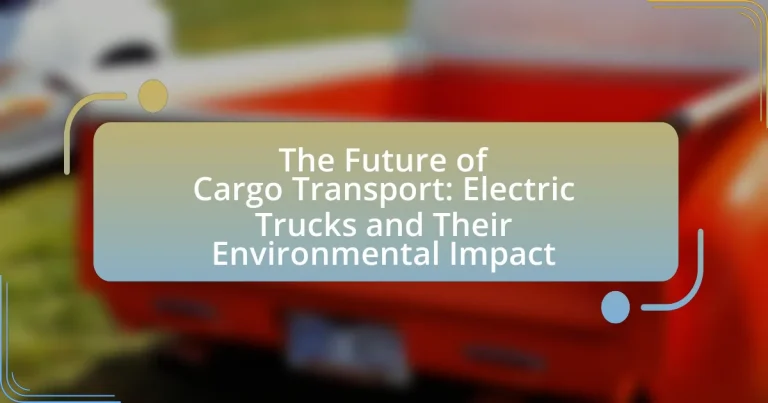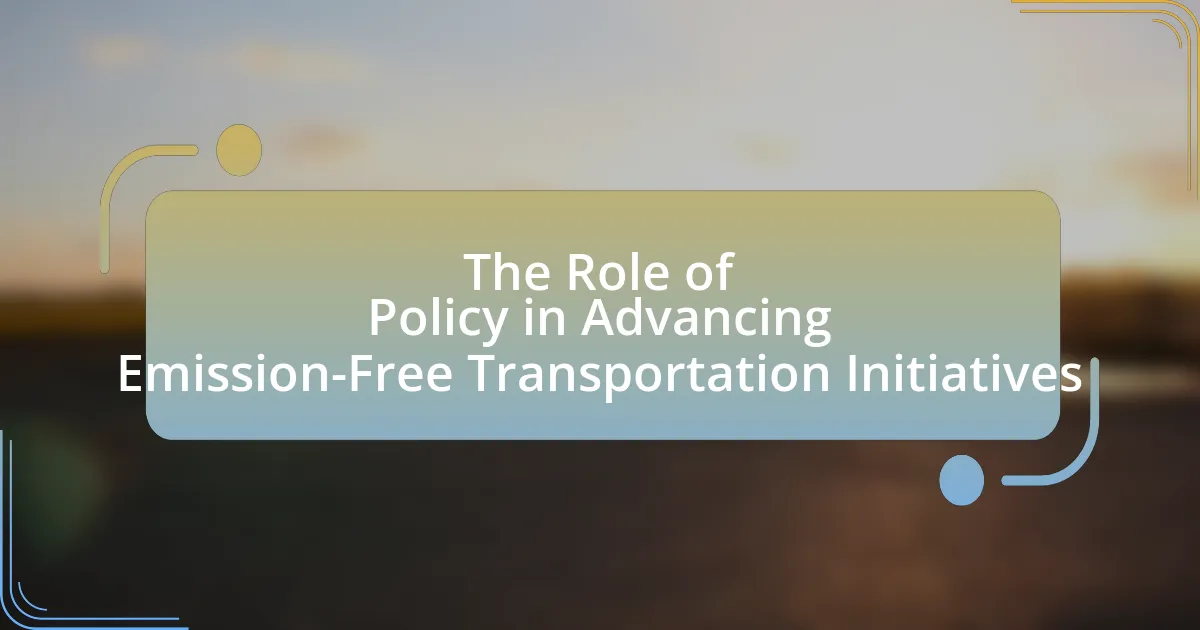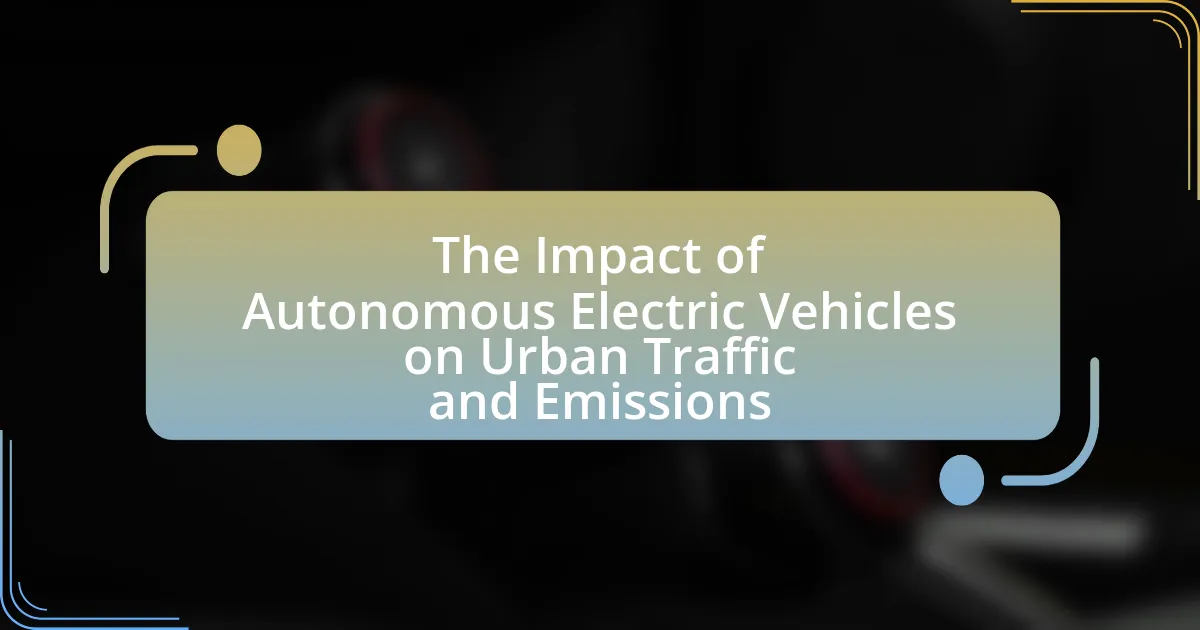The article focuses on the future of cargo transport through electric trucks and their significant environmental impact. It highlights advancements in battery technology, regulatory support, and the projected growth of the electric truck market, which is expected to reach $1.2 trillion by 2030. Key discussions include the reduction of greenhouse gas emissions by up to 70% compared to diesel trucks, the transformation of the logistics industry through lower operational costs and improved air quality, and the challenges related to range limitations and charging infrastructure. Additionally, the article examines the role of government policies, technological advancements, and best practices for companies adopting electric trucks, emphasizing their importance in achieving sustainability goals and reducing carbon emissions in the transportation sector.

What is the Future of Cargo Transport with Electric Trucks?
The future of cargo transport with electric trucks is poised for significant growth, driven by advancements in battery technology and increasing regulatory support for sustainable practices. Electric trucks are expected to reduce greenhouse gas emissions by up to 70% compared to traditional diesel trucks, as evidenced by a study from the International Council on Clean Transportation, which highlights the environmental benefits of transitioning to electric vehicles. Additionally, the global electric truck market is projected to reach $1.2 trillion by 2030, according to a report by Allied Market Research, indicating a strong shift towards electrification in the logistics sector. This transition will not only enhance operational efficiency but also align with global sustainability goals, making electric trucks a cornerstone of future cargo transport.
How are electric trucks transforming the cargo transport industry?
Electric trucks are transforming the cargo transport industry by significantly reducing greenhouse gas emissions and operational costs. These vehicles produce zero tailpipe emissions, which contributes to improved air quality and aligns with global sustainability goals. According to a study by the International Council on Clean Transportation, electric trucks can reduce lifecycle greenhouse gas emissions by up to 70% compared to diesel trucks, depending on the energy source used for charging. Additionally, electric trucks have lower maintenance costs due to fewer moving parts and the absence of traditional combustion engines, which can lead to savings of up to 30% in operational expenses. This shift not only enhances environmental sustainability but also promotes economic efficiency within the cargo transport sector.
What technological advancements are driving electric truck development?
Technological advancements driving electric truck development include improvements in battery technology, electric drivetrains, and autonomous driving systems. Enhanced battery technology, such as solid-state batteries, offers higher energy density and faster charging times, which are crucial for increasing the range and efficiency of electric trucks. Electric drivetrains have become more efficient, providing better torque and performance, which is essential for heavy-duty applications. Additionally, advancements in autonomous driving technology are enabling electric trucks to operate more safely and efficiently, reducing operational costs and improving logistics. These developments are supported by significant investments from major automotive manufacturers and technology companies, indicating a strong commitment to the future of electric trucking.
How do electric trucks compare to traditional diesel trucks?
Electric trucks are generally more environmentally friendly and efficient compared to traditional diesel trucks. Electric trucks produce zero tailpipe emissions, significantly reducing air pollution, while diesel trucks emit greenhouse gases and particulate matter, contributing to climate change and health issues. According to a study by the Union of Concerned Scientists, electric trucks can reduce lifecycle greenhouse gas emissions by up to 70% compared to diesel trucks, depending on the energy source used for electricity generation. Additionally, electric trucks often have lower operating costs due to reduced fuel expenses and less maintenance, as they have fewer moving parts than diesel engines.
Why is the shift to electric trucks important for the environment?
The shift to electric trucks is important for the environment because it significantly reduces greenhouse gas emissions compared to traditional diesel trucks. Diesel trucks are responsible for approximately 29% of greenhouse gas emissions from the transportation sector in the United States, contributing to climate change and air pollution. Electric trucks, powered by renewable energy sources, can eliminate tailpipe emissions entirely, leading to improved air quality and reduced health risks associated with pollution. Additionally, studies indicate that transitioning to electric trucks can lower overall carbon emissions by up to 70% over their lifetime when charged with renewable energy, making them a crucial component in achieving sustainability goals and combating climate change.
What are the environmental benefits of using electric trucks?
Electric trucks significantly reduce greenhouse gas emissions compared to traditional diesel trucks. According to the U.S. Environmental Protection Agency, electric vehicles produce zero tailpipe emissions, which contributes to improved air quality and reduced urban pollution. Additionally, electric trucks are generally more energy-efficient, converting over 77% of electrical energy from the grid to power at the wheels, compared to only about 12% to 30% for gasoline vehicles. This efficiency leads to lower overall energy consumption and a smaller carbon footprint. Furthermore, as the electricity grid becomes greener with more renewable energy sources, the environmental benefits of electric trucks will continue to increase, further mitigating climate change impacts.
How do electric trucks reduce carbon emissions in cargo transport?
Electric trucks reduce carbon emissions in cargo transport by utilizing electric power instead of diesel or gasoline, which significantly lowers greenhouse gas emissions. Traditional diesel trucks emit approximately 22 pounds of carbon dioxide per gallon of fuel burned, while electric trucks produce zero tailpipe emissions. Additionally, when charged with renewable energy sources, the overall carbon footprint of electric trucks can be further minimized. According to a study by the Union of Concerned Scientists, electric trucks can reduce emissions by up to 70% compared to their diesel counterparts when considering the entire lifecycle of energy production and consumption.
What challenges do electric trucks face in cargo transport?
Electric trucks face several challenges in cargo transport, primarily related to range limitations, charging infrastructure, payload capacity, and initial costs. Range limitations hinder electric trucks from covering long distances without recharging, which can disrupt logistics and delivery schedules. The availability of charging infrastructure is often insufficient, particularly in rural or remote areas, making it difficult for electric trucks to operate efficiently. Additionally, electric trucks may have lower payload capacities compared to traditional diesel trucks due to the weight of batteries, which can affect their competitiveness in freight transport. Finally, the higher upfront costs of electric trucks can deter companies from investing in this technology, despite potential long-term savings on fuel and maintenance.
What are the limitations of current electric truck technology?
Current electric truck technology faces several limitations, including limited range, long charging times, and high upfront costs. The average range of electric trucks is typically between 100 to 300 miles per charge, which restricts their usability for long-haul transport compared to diesel trucks that can travel over 1,000 miles without refueling. Charging infrastructure is also underdeveloped, leading to extended downtime during charging, which can take several hours. Additionally, the initial purchase price of electric trucks is significantly higher than that of traditional trucks, often due to the cost of batteries, which can deter widespread adoption. These factors collectively hinder the efficiency and practicality of electric trucks in the cargo transport sector.
How does the infrastructure for electric trucks impact their adoption?
The infrastructure for electric trucks significantly impacts their adoption by determining the availability and accessibility of charging stations, which directly influences operational feasibility for logistics companies. A well-developed charging network reduces range anxiety, enabling fleet operators to plan routes efficiently without concerns about running out of power. For instance, a study by the International Council on Clean Transportation found that increasing the number of fast-charging stations can lead to a 50% increase in electric truck adoption rates. Additionally, the presence of supportive infrastructure, such as dedicated electric truck lanes and maintenance facilities, further enhances the attractiveness of electric trucks for commercial use, facilitating smoother transitions from traditional diesel vehicles.
How can the transition to electric trucks be facilitated?
The transition to electric trucks can be facilitated through the development of robust charging infrastructure, government incentives, and advancements in battery technology. Establishing widespread charging stations along major freight routes ensures that electric trucks can operate efficiently without range anxiety. Government incentives, such as tax credits and grants for fleet operators, encourage the adoption of electric vehicles by reducing initial costs. Furthermore, advancements in battery technology, including increased energy density and faster charging capabilities, enhance the practicality of electric trucks for long-haul transport. These measures collectively support the shift towards electric trucks, aligning with sustainability goals and reducing greenhouse gas emissions in the cargo transport sector.
What role do government policies play in promoting electric trucks?
Government policies play a crucial role in promoting electric trucks by providing incentives, regulations, and funding that encourage their adoption. These policies include tax credits for manufacturers and consumers, grants for research and development, and stricter emissions standards that push companies to transition to electric vehicles. For instance, the U.S. government has implemented the Clean Air Act, which sets emissions limits that incentivize the use of electric trucks to meet compliance. Additionally, various states offer rebates and incentives for electric truck purchases, further driving market demand. Such policies not only lower the cost barrier for consumers and businesses but also align with broader environmental goals, contributing to reduced greenhouse gas emissions and improved air quality.

What are the specific environmental impacts of electric trucks?
Electric trucks significantly reduce greenhouse gas emissions compared to traditional diesel trucks, contributing to improved air quality and lower carbon footprints. Studies indicate that electric trucks can reduce emissions by up to 70% over their lifetime when powered by renewable energy sources. Additionally, electric trucks produce less noise pollution, which benefits urban environments and reduces stress for nearby residents. The production of electric truck batteries, however, can have environmental impacts, including resource extraction and energy consumption, but advancements in recycling and sustainable sourcing are mitigating these effects. Overall, the transition to electric trucks presents a substantial opportunity for reducing the environmental impact of freight transport.
How do electric trucks contribute to reducing air pollution?
Electric trucks contribute to reducing air pollution by eliminating tailpipe emissions, which are a significant source of pollutants such as nitrogen oxides and particulate matter. Unlike traditional diesel trucks, electric trucks operate on batteries and produce zero emissions during operation. According to the U.S. Environmental Protection Agency, transportation accounts for nearly 29% of total greenhouse gas emissions, and transitioning to electric vehicles can significantly lower this percentage. Additionally, studies indicate that electric trucks can reduce overall greenhouse gas emissions by up to 70% when charged with renewable energy sources. This shift not only improves air quality but also supports public health by decreasing respiratory and cardiovascular diseases linked to air pollution.
What are the long-term effects of reduced emissions from electric trucks?
Reduced emissions from electric trucks lead to significant long-term environmental and health benefits. The transition to electric trucks can decrease greenhouse gas emissions by up to 75% compared to diesel trucks, contributing to improved air quality and reduced climate change impacts. Studies indicate that lower emissions result in fewer respiratory and cardiovascular diseases, ultimately reducing healthcare costs and improving public health outcomes. Additionally, the shift to electric trucks supports the transition to renewable energy sources, further enhancing sustainability in the transportation sector.
How do electric trucks impact noise pollution in urban areas?
Electric trucks significantly reduce noise pollution in urban areas due to their quieter operation compared to traditional diesel trucks. Research indicates that electric vehicles produce noise levels that are 10 to 20 decibels lower than their internal combustion engine counterparts, which translates to a noticeable decrease in ambient noise. This reduction in noise pollution can lead to improved quality of life for urban residents, as excessive noise is linked to various health issues, including stress and sleep disturbances. Studies, such as those conducted by the European Commission, highlight that the transition to electric trucks can contribute to quieter urban environments, thereby enhancing overall urban livability.
What is the lifecycle environmental impact of electric trucks?
The lifecycle environmental impact of electric trucks is significantly lower than that of traditional diesel trucks. Electric trucks produce zero tailpipe emissions during operation, which reduces air pollution and greenhouse gas emissions. A study by the Union of Concerned Scientists indicates that electric trucks can reduce lifecycle greenhouse gas emissions by 50% to 70% compared to diesel trucks, depending on the electricity source used for charging. Additionally, while battery production does have environmental impacts, advancements in battery recycling and the use of renewable energy in manufacturing are mitigating these effects. Overall, the transition to electric trucks represents a substantial opportunity for reducing the environmental footprint of cargo transport.
How does battery production affect the overall sustainability of electric trucks?
Battery production significantly impacts the overall sustainability of electric trucks due to the environmental consequences associated with mining, manufacturing, and disposing of battery materials. The extraction of lithium, cobalt, and nickel, essential for battery production, often leads to habitat destruction, water pollution, and high carbon emissions. For instance, lithium extraction in South America has been linked to water depletion in local communities, affecting agriculture and drinking water supplies. Furthermore, the manufacturing process of batteries is energy-intensive, contributing to greenhouse gas emissions. According to a study by the International Council on Clean Transportation, the production of electric vehicle batteries can generate up to 150 kg of CO2 per kWh of battery capacity. Lastly, the end-of-life disposal of batteries poses challenges, as improper recycling can lead to toxic waste. Therefore, while electric trucks offer reduced emissions during operation, the sustainability of their overall lifecycle is heavily influenced by the practices surrounding battery production.
What are the recycling options for electric truck batteries?
Recycling options for electric truck batteries include repurposing, material recovery, and specialized recycling processes. Repurposing involves using batteries for secondary applications, such as energy storage systems, which extends their life cycle. Material recovery focuses on extracting valuable components like lithium, cobalt, and nickel through hydrometallurgical or pyrometallurgical methods, allowing these materials to be reused in new batteries. Specialized recycling processes, such as those developed by companies like Redwood Materials, aim to efficiently recover and recycle battery materials, reducing environmental impact and resource depletion. According to the International Energy Agency, effective recycling can recover up to 95% of battery materials, highlighting the importance of these options in managing electric truck battery waste.

What are the future trends in electric truck technology?
Future trends in electric truck technology include advancements in battery efficiency, increased range, and the integration of autonomous driving capabilities. Battery technology is expected to improve significantly, with solid-state batteries potentially offering greater energy density and faster charging times compared to current lithium-ion batteries. For instance, companies like Tesla and Rivian are investing heavily in research to enhance battery performance, which could lead to electric trucks achieving ranges exceeding 500 miles on a single charge. Additionally, the adoption of autonomous driving technology is anticipated to enhance logistics efficiency and reduce operational costs, as seen in pilot programs by companies such as Waymo and Aurora. These trends indicate a shift towards more sustainable and efficient cargo transport solutions, aligning with global efforts to reduce carbon emissions in the transportation sector.
How is autonomous driving technology influencing electric trucks?
Autonomous driving technology is significantly enhancing the efficiency and safety of electric trucks. By integrating advanced sensors, machine learning algorithms, and real-time data processing, autonomous systems enable electric trucks to optimize routes, reduce energy consumption, and minimize human error. For instance, studies indicate that autonomous trucks can improve fuel efficiency by up to 10% through optimized driving patterns and reduced idling times. Furthermore, the combination of electric powertrains with autonomous capabilities allows for more sustainable logistics operations, as these trucks can operate continuously with minimal downtime, thereby increasing overall productivity in cargo transport.
What advancements are being made in battery technology for electric trucks?
Advancements in battery technology for electric trucks include the development of solid-state batteries, which offer higher energy density and improved safety compared to traditional lithium-ion batteries. Companies like Toyota and QuantumScape are leading research in this area, aiming to enhance the range and efficiency of electric trucks. Additionally, innovations in fast-charging technology are being implemented, allowing electric trucks to recharge significantly quicker, thus reducing downtime. For instance, Tesla’s Supercharger V3 technology can provide up to 250 kW of power, enabling rapid charging. These advancements are crucial for increasing the viability of electric trucks in long-haul transport, addressing range anxiety, and promoting wider adoption in the logistics industry.
How will charging infrastructure evolve to support electric trucks?
Charging infrastructure will evolve to support electric trucks by increasing the number of high-capacity charging stations strategically located along major freight routes. This evolution is driven by the growing demand for electric trucks, which are projected to constitute a significant portion of the commercial vehicle market by 2030, with estimates suggesting that electric trucks could account for up to 30% of new truck sales in that year. To accommodate the longer ranges and heavier loads of electric trucks, charging stations will need to provide faster charging capabilities, such as ultra-fast chargers that can deliver 350 kW or more, reducing downtime for logistics companies. Additionally, partnerships between governments and private sector stakeholders will facilitate the development of charging networks, ensuring that infrastructure keeps pace with the increasing adoption of electric trucks.
What are the best practices for companies adopting electric trucks?
The best practices for companies adopting electric trucks include conducting a thorough cost-benefit analysis, investing in charging infrastructure, training staff on electric vehicle operations, and integrating electric trucks into existing logistics systems. A cost-benefit analysis helps companies understand the financial implications, including potential savings on fuel and maintenance, as electric trucks typically have lower operating costs compared to diesel trucks. Investing in charging infrastructure is crucial, as access to reliable charging stations ensures operational efficiency and minimizes downtime. Training staff is essential to maximize the benefits of electric trucks, as employees need to be familiar with their unique handling and maintenance requirements. Finally, integrating electric trucks into logistics systems allows for optimized routes and schedules, enhancing overall fleet performance. According to a report by the International Council on Clean Transportation, electric trucks can reduce greenhouse gas emissions by up to 70% compared to traditional diesel trucks, reinforcing the environmental benefits of adopting this technology.
How can companies effectively integrate electric trucks into their fleets?
Companies can effectively integrate electric trucks into their fleets by conducting a thorough analysis of their operational needs and infrastructure capabilities. This involves assessing the routes, load requirements, and charging station availability to ensure compatibility with electric truck specifications. For instance, a study by the International Council on Clean Transportation found that electric trucks can reduce greenhouse gas emissions by up to 70% compared to diesel trucks, making them a sustainable choice for fleet operations. Additionally, companies should invest in training for drivers and maintenance staff to handle the unique aspects of electric vehicles, ensuring optimal performance and safety. By strategically planning the transition and leveraging available incentives, such as government subsidies for electric vehicle purchases, companies can enhance their fleet efficiency while contributing to environmental sustainability.
What strategies can be employed to maximize the benefits of electric trucks?
To maximize the benefits of electric trucks, companies should implement strategies such as optimizing route planning, investing in charging infrastructure, and utilizing telematics for performance monitoring. Optimizing route planning reduces energy consumption by ensuring that electric trucks take the most efficient paths, which can lead to a reduction in operational costs and emissions. Investing in charging infrastructure, including fast-charging stations, enhances the operational efficiency of electric trucks by minimizing downtime and ensuring that vehicles are charged during off-peak hours. Utilizing telematics allows companies to monitor vehicle performance and energy usage in real-time, enabling data-driven decisions that can improve efficiency and reduce costs. These strategies collectively enhance the operational effectiveness of electric trucks, contributing to lower emissions and improved sustainability in cargo transport.





